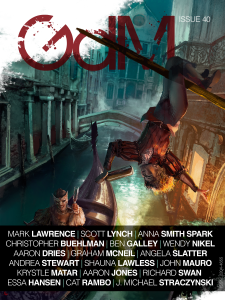Grimdark, Home of the Other
If grimdark is the home of the obscene, perhaps it’s no wonder that it draws in the outsider. Those deemed obscene by the wider world come to grimdark to express themselves without apology.
 It’s no secret to anyone who knows me that I’m ravenous for the resurgence of Western histfic and Western fantasy. One of my favourites thus far has been Amazon Prime’s miniseries The English (2022) starring Emily Blunt and Chaske Spencer. I was thrilled to watch (and rewatch) my beloved Western setting telling the story of a doomed Englishwoman and a stubborn Pawnee veteran struggling for survival and vengeance in the post-Civil War era.
It’s no secret to anyone who knows me that I’m ravenous for the resurgence of Western histfic and Western fantasy. One of my favourites thus far has been Amazon Prime’s miniseries The English (2022) starring Emily Blunt and Chaske Spencer. I was thrilled to watch (and rewatch) my beloved Western setting telling the story of a doomed Englishwoman and a stubborn Pawnee veteran struggling for survival and vengeance in the post-Civil War era.
The English’s story—which takes place over six episodes—is gloriously violent, blood-soaked, mournful, determined, bleak, hopeful, and beautiful. An absolute smorgasbord for the grimdark fan, The English takes a hard, ugly stare at the history of the American West and how it treated its vulnerable.
Jumping over to books, I recently devoured The Woods All Black by Lee Mandelo, thanks to a glowing review by GdM reviewer Fabienne Schwizer. Fabienne she summed up the powerful novella thusly:
“Set in rural Appalachia in 1929, we encounter a clash between queerness and entrenched small communities—and it’s also in many ways a story still relevant in this day and age, where the hate faced by the trans community has never been bigger.”
It’s not lost on me that some of the most memorable, confronting, and downright cathartic grimdark to cross my path lately has been stories about and/or written by people on the fringes of our era. Voices that refuse to be silenced are turning to fiction and to grimdark specifically where they write the stories of desperate survivors who face their bleak fictional worlds and overcome the brutal worldbuilding the author has conceived, as if to say ‘I will survive this, too.’
Grimdark has become a place where the wounded other can bleed their pain upon the page. The inherent violence in the genre lends itself brilliantly to a kind of healing that comes only when the writer can share the ugliness that lives in their existence. Ugliness inflicted on them by the world at large, ugliness that lives like a scar across their souls. When the world seemed determined to brutalize a person simply because they are themselves, grimdark is the sanctuary where they can expose the brutality and conquer it.
As the world around me spirals into chaos, I find myself retreating to the comforting embrace of grimdark. It’s a genre and a space that seems to understand the complicated mixture of my anger and my hope. It’s a stubborn genre, one that refuses to conform to the greater market. Gossip constantly cycles around that grimdark is dead, that the genre has slid out of its heyday. But grimdark spits the blood out of its mouth and stands straighter than before, supported by the army of the other.
The future of grimdark lies in its diversity. It’s built, one foundation stone at a time, by the resilient and the broken, by the outcast and the survivor. I see the future of grimdark as a protest against the world that tells us we are the obscene. ‘And if we are,’ grimdark says, ‘you made us this way.’
Grimdark survives in the hands of the reader and the writer who sees the beauty in the struggle to keep hope alive. Hope is not a clean thing; it’s hard as nails and covered in blood and wrenched from iron-hard grip of despair. And if we have to get ugly to keep hope in our grasp? So be it.
Long live the desperate hope of those of us deemed obscene.
Long live grimdark.
Read Grimdark Magazine #40The post Grimdark, Home of the Other appeared first on Grimdark Magazine.



